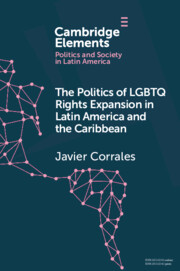Element contents
The Politics of LGBTQ Rights Expansion in Latin America and the Caribbean
Published online by Cambridge University Press: 22 December 2021
Summary
Keywords
- Type
- Element
- Information
- Online ISBN: 9781108993609Publisher: Cambridge University PressPrint publication: 07 April 2022
Bibliography
- 15
- Cited by

